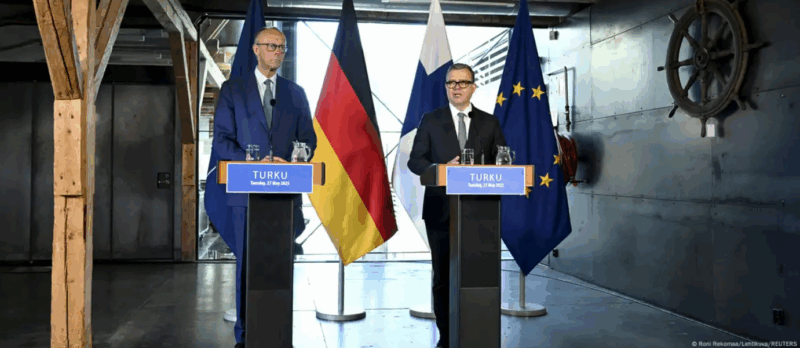
Israel forcing Germany to reconsider support, says former Israeli ambassador to Berlin
Shimon Stein, who served as Israel’s ambassador to Germany from 2001 to 2007, spoke to DW about German Chancellor Friedrich Merz’s recent shift in tone towards Israel.
Israel’s European allies have grown increasingly frustrated over Israel’s military campaign in Gaza and the worsening humanitarian situation in the Palestinian enclave.
Merz has said that Germany cannot remain silent if Israel continues to break international law in its war with Hamas. In Merz’s coalition government, some have called for a halt on arms exports to Israel.
“We have reached a point when German interests are not being upheld the way it understands its interest with respect to whatever Israel does,” Stein said.
He highlighted Israel’s military objectives in Gaza, Israeli Prime Minister Benjamin Netanyahu’s “undefined total victory” and the “crazy plan” proposed by US President Donald Trump to turn “Gaza into a Riviera and evict two million Palestinians.”
Germany’s top diplomat heads to US for talks on Ukraine, Mideast, trade
Germany’s new foreign minister, Johann Wadephul, is set to travel to Washington for talks with US Secretary of State Marco Rubio focused on the Ukraine and Middle East conflicts, NATO ties, and strained trade relations.
In his first visit to the United States since taking office, Wadephul said the longstanding German-American partnership had been vital to his country’s postwar freedom and prosperity.
“We Germans owe almost no other country as much as the United States,” he said in a statement before departure.
Wadephul said his top priority was ending the war in Ukraine through an immediate ceasefire and lasting peace.
Calling Russia “the greatest threat to Euro-Atlantic security for the foreseeable future,” Wadephul emphasized that Europe is assuming greater responsibility for its own defense.
He reiterated Germany’s support for a NATO proposal to boost combined defense and security-related spending to 5% of GDP — split between 3.5% for defense and 1.5% for infrastructure and related areas.
On the Middle East, Wadephul said Germany stands by Israel’s security but also recognizes “the unbearable suffering of the people in Gaza.” He urged progress toward a ceasefire, the release of hostages, and a major scale-up in humanitarian aid.
Addressing trade tensions following US President Donald Trump’s return to office, Wadephul pushed for dialogue. “We don’t want to erect new tariff barriers, but rather build stable bridges of partnership and trust,” he said, voicing support for a negotiated EU-US solution to reduce unnecessary trade obstacles.
“Only in this way will we succeed in preserving prosperity on both sides of the Atlantic and strengthening our economic security,” he added.
German army must spend new funds responsibly — federal auditors
The massive boost in German defense spending must be wisely utilized, and the German army should implement major reforms to ensure this is the case, Germany’s federal auditors said on Tuesday.
In a report, the Bonn-based Bundesrechnungshof said the Bundeswehr must focus on its core mission of defending Germany and its allies and reduce administrative processes despite receiving the increased funding.
“‘Whatever it takes’ must not become ‘money doesn’t matter!'” said Kay Scheller, president of Bundesrechnungshof. “It is crucial that these funds are used responsibly to significantly increase the effectiveness of defense spending.”
Germany drastically reformed strict constitutional rules on deficit spending in March, allowing the new government to boost military expenditure in view of the changed security landscape in Europe caused largely by Russia’s aggression and the Trump administration’s pivot away from support for the continent.
However, the auditors warned that “a permanent and solid financing of Germany’s defense capability is not guaranteed by a budget that is heavily financed by debt and therefore structurally unsustainable.”
The report also said that the German military had become “top-heavy” and required a greater number of
regular soldiers.
Source : https://www.dw.com/en/germany-updates-merz-elaborates-on-ukraine-gaza-policies/live-72679832









